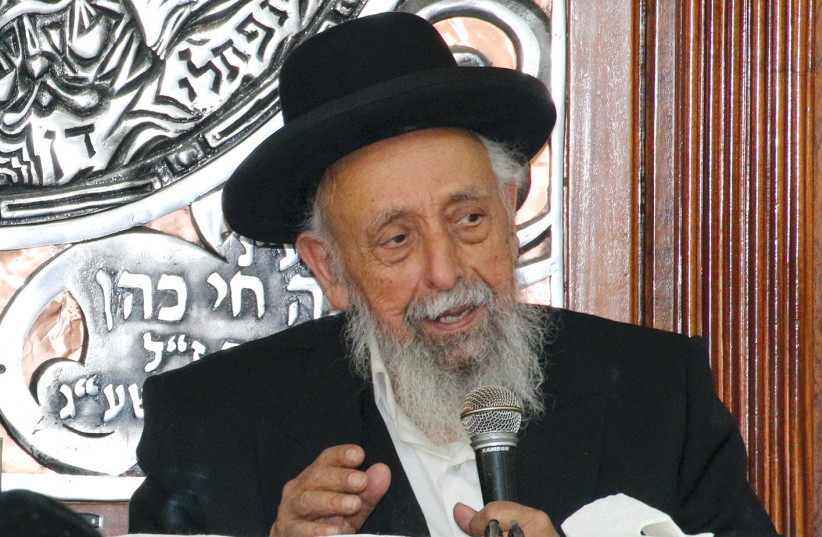14 Days: IDF chief

Israeli news highlights from the past two weeks.
IDF CHIEF
Sharon Halevi strokes the cheek of her husband, new Chief of Staff Herzi Halevi, in a ceremony at the Prime Minister’s Office on January 16 at which he was given the rank of lieutenant-general by Prime Minister Benjamin Netanyahu and Defense Minister Yoav Gallant. Halevi vowed that the IDF would be professional, moral and “free from all considerations other than security.” He served in a series of top posts in the IDF, most recently as deputy chief of staff. The Jerusalem-born Halevi, 55, and his wife have four children and live in Kfar HaOranim.
MENGISTU VIDEO
On the same day that Herzi Halevi became chief of staff, Hamas released a video of Avera Mengistu, an Israeli held hostage in Gaza since 2014. “I am the prisoner Avera Mengistu,” he says in the video. “How long will I and my friends be here in captivity? After long years of pain, where are the country and the people of Israel regarding our fate?” Mengistu is being held along with another Israeli, Hisham al-Sayed, who had also crossed into Gaza of his own volition in 2015. In addition, Hamas has the bodies of Oron Shaul and Hadar Goldin, two IDF soldiers that Israel declared fallen in its conflict with Hamas in 2014.
DERI DISMISSED
Prime Minister Netanyahu dismissed Shas leader Arye Deri as interior and health minister on January 22, a week after the High Court of Justice struck down the appointments, with 10 judges supporting the decision and one dissenting. The High Court ruled that Deri’s appointment was “unreasonable in the extreme” due to his previous convictions for corruption. “I intend to look for any legal way in which you can continue to contribute to the State of Israel from your vast experiences and skills, in accordance with the will of the people,” Netanyahu wrote to Deri.
HAYUT’S WARNING
Supreme Court President Esther Hayut on January 12 denounced the new government’s plan to radically overhaul Israel’s judicial system, saying it would deal a “fatal blow” to Israel’s democracy. Addressing a conference of the Israeli Association of Public Law in Haifa, Hayut said: “This is a plan to crush the justice system. It is designed to deal a fatal blow to the independence of the judiciary and silence it.” Justice Minister Yariv Levin, who is spearheading the reforms, chastised Hayut, claiming her speech had violated ethical rules for serving judges. Some 100,000 people demonstrated in Tel Aviv on January 21 against the government’s judicial reform plan, while smaller protests were held in Jerusalem and Haifa.
TERRORISTS RELEASED
Maher Younis was released from prison on January 19 after serving a 40-year sentence, two weeks after his cousin, Karim Younis, was freed after serving a similar term. They were sentenced to the longest continuous sentence of any Palestinians in an Israeli prison after they kidnapped and murdered IDF soldier Avraham Bromberg in 1983. National Security Minister Itamar Ben-Gvir’s office said in a statement that upon his instructions, police “did not allow tents for support of terrorism to be erected or the waving of PLO or Fatah flags in the streets.”
ECONOMIC PLAN
Prime Minister Netanyahu and Finance Minister Bezalel Smotrich unveiled the new government’s plan to combat the high cost of living on January 11. Netanyahu said the four-point plan comprised a one-year freeze on municipal property tax rates; a reduction in excise fuel taxes by NIS 0.10 a liter until the end of 2023; cutting a planned 8.2% electricity price hike in January to 2.5%; and cutting a planned 3.5% water price rise to 1%. “These steps will immediately lower the monthly expenses of every household in Israel,” Netanyahu pledged, adding that reducing basic costs would be like “putting sticks in the wheel of inflation,” which reached 5.3% at the end of 2022.
SHAS RABBI
The spiritual leader of Shas and head of Torah and Life Yeshiva in Bnei Brak, Rabbi Shimon Baadani, died on January 11 at the age of 95 after being hospitalized in late November. Baadani was born in Hadera in 1928 to Yemenite parents, who moved to Palestine after World War I. He was appointed head of the Bnei Brak Council of Torah Sages in 1972, and when Shas was established as a political movement in 1984, he was chosen to be on its council of spiritual leaders. As the preeminent spiritual leader of Shas following the death of Rabbi Ovadia Yosef in 2013, he was a firm supporter of a political partnership with the Likud and of Arye Deri as leader of the party.
Jerusalem Post Store
`; document.getElementById("linkPremium").innerHTML = cont; var divWithLink = document.getElementById("premium-link"); if (divWithLink !== null && divWithLink !== 'undefined') { divWithLink.style.border = "solid 1px #cb0f3e"; divWithLink.style.textAlign = "center"; divWithLink.style.marginBottom = "15px"; divWithLink.style.marginTop = "15px"; divWithLink.style.width = "100%"; divWithLink.style.backgroundColor = "#122952"; divWithLink.style.color = "#ffffff"; divWithLink.style.lineHeight = "1.5"; } } (function (v, i) { });

